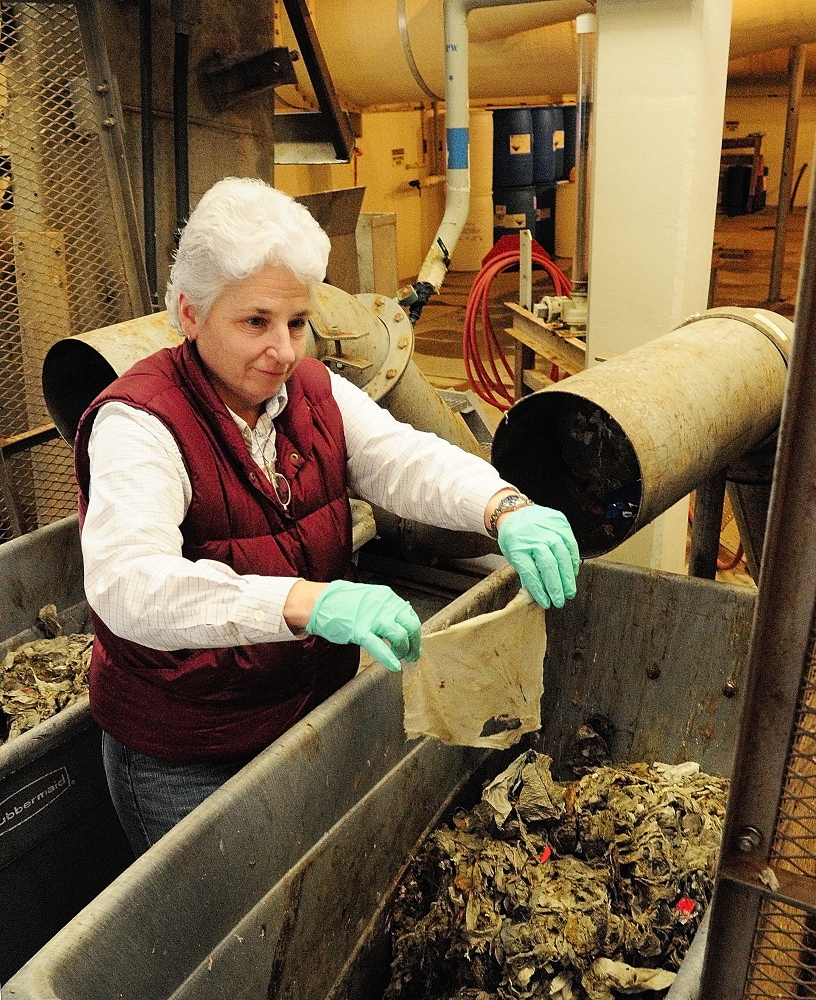AUGUSTA — Baby wipes may cost only a couple of bucks a pack in the store, but if they’re flushed down the toilet, they can not only clog your plumbing, they can plug up pumps and other equipment in the sewer system, damaging expensive equipment and racking up tens of thousands of dollars in labor costs every year.
The seemingly harmless convenience item is the scourge of wastewater treatment plants across the nation, local officials say, and millions of dollars are spent installing equipment to prevent flushed wipes — and other items that aren’t supposed to be flushed down the toilet — from plugging and damaging public sewer systems.
Numerous intact baby wipes could be seen Friday at the wastewater treatment plant in Augusta, where officials said investments including $200,000 of work a couple years ago on a sludge holding tank, and a planned $100,000 upgrade to a filter system, were driven by the need to keep baby wipes and other unwanted, not-meant-to-be-flushed items from clogging up pumps in the system.
The solution seems relatively simple.
“In the trash, not the toilet,” Jane Carroll, process and safety director for the Greater Augusta Utility District, said of what should be done with baby wipes. “Our whole purpose for being here is to protect the environment. People can help us do our jobs, and protect the river, if they just don’t flush stuff that doesn’t belong.”
Carroll still recalls workers coming across a huge stuck-together mass of “rags” — the industry term for cloth materials, much of it made up of baby wipes, which clog up sewer systems — a couple of years ago during a project on the west side of Kennebec River.
She happened to be there as workers squared off with a mass of rags that was plugging up the system.
“It was the size of a Volkswagen bus,” she said. “It had been plugged up for a few months. So those (baby wipes) had been in there a while, and they still hadn’t broken down.”
Greater Augusta Utility District officials are joining other wastewater officials across the state in an effort to educate people not to flush baby wipes down the toilet.
A partner in the campaign with the Maine WasteWater Control Association is INDA, the Association of the Nonwoven Fabrics Industry, a trade group which includes producers of baby wipes.
“Some products are designed to be flushed, while others are not,” Dave Rousse, INDA president, said in a news release. “It is the products that are not designed to be flushed, but get flushed anyway, such as baby wipes, that are creating problems for wastewater systems. We are working collaboratively with Maine’s wastewater entities to change this.”
Phyllis Rand, water quality coordinator for the Greater Augusta Utility District, said there are flushable cloth wipes, sometimes called kid wipes, which perform a similar function but are made using chemicals which break down faster, so they disintegrate in the sewer system after several hours.
She said a Maine Wastewater Control Association survey found 90 percent of its members had problems with baby wipes. A survey in 2011 found Maine treatment plants spent an average of $40,000 that year alone on equipment or labor battling baby wipes flushed into sewer systems.
Carroll said Greater Augusta Utility District probably spends tens of thousands of dollars in labor alone dealing with baby wipes.
The district uses a bar rack and rag press system to filter out baby wipes and other items that don’t belong in the sewer. A large cart used to catch the collected debris — within which there were several intact baby wipes — sometimes fills up daily and has to be dumped out so the material can be hauled off to Hatch Hill landfill.
This spring the district plans to install a tighter screen into the bar rack and rag press system, to keep more items, including baby wipes, from getting into the treatment system. The project is expected to cost about $100,000.
Brian Tarbuck, superintendent of the district, said it should be easy for people with babies to throw baby wipes away, as they’re probably already throwing used diapers into the trash anyway.
But Rand said a study indicates up to 40 percent of consumers of baby wipes don’t have babies. They use them for their own personal hygiene — which would be fine, if they’d just throw the wipes away into the trash, not the toilet. Or, she said, use flushable wipes.
She said labeling wipe products as flushable or nonflushable is voluntary, and she’d like to see it be mandatory. Wastewater officials also want a standard to be established to determine whether products are flushable or nonflushable, and products to be more clearly and prominently labeled as such.
And the consequences aren’t always at the treatment plant or sewer system pump stations. Baby wipes also can plug up plumbing systems in homes, potentially causing untreated sewage to back up into, or even over, toilets.
Keith Edwards — 621-5647kedwards@centralmaine.com
Copy the Story LinkSend questions/comments to the editors.




Success. Please wait for the page to reload. If the page does not reload within 5 seconds, please refresh the page.
Enter your email and password to access comments.
Hi, to comment on stories you must . This profile is in addition to your subscription and website login.
Already have a commenting profile? .
Invalid username/password.
Please check your email to confirm and complete your registration.
Only subscribers are eligible to post comments. Please subscribe or login first for digital access. Here’s why.
Use the form below to reset your password. When you've submitted your account email, we will send an email with a reset code.